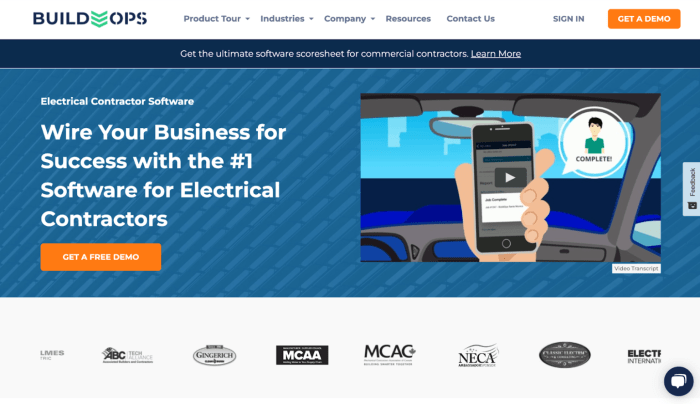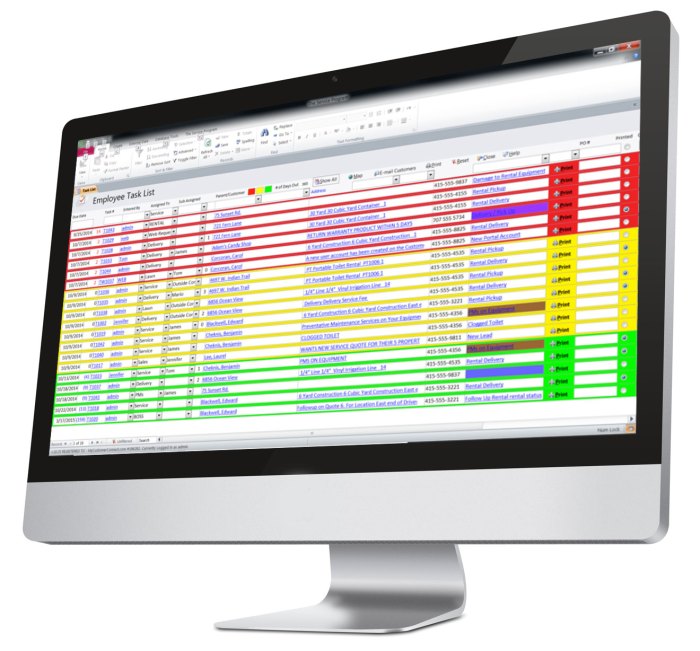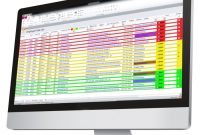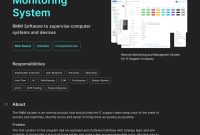Electrical contractor software is revolutionizing the industry, transforming how electricians manage projects, track finances, and communicate with clients. From streamlined scheduling to precise estimations and automated billing, the right software can significantly boost efficiency and profitability. This deep dive explores the functionalities, benefits, and future trends of this game-changing technology, helping you navigate the complexities and unlock your business’s full potential.
This article covers everything from choosing the right software to implementing it effectively and maximizing its impact on your bottom line. We’ll delve into key features, compare different software options, and even look at how emerging technologies like AI and IoT are shaping the future of electrical contracting. Get ready to electrify your business operations!
Defining Electrical Contractor Software

Navigating the complex world of electrical contracting requires more than just expertise with wiring and circuits. Efficient project management, accurate estimations, and streamlined billing are crucial for profitability and client satisfaction. This is where specialized electrical contractor software steps in, transforming how businesses operate and ultimately impacting their bottom line.Electrical contractor software encompasses a suite of tools designed to automate and optimize various aspects of an electrical contracting business.
You also will receive the benefits of visiting business software apps for small businesses today.
These programs handle everything from initial project planning and budgeting to final invoicing and client communication. They are essentially the digital backbone of a modern electrical contracting firm, enabling greater efficiency and better control over operations.
Core Functionalities of Electrical Contractor Software
The core functionalities of most electrical contractor software packages revolve around project management, estimating, and billing. Project management features typically include task scheduling, resource allocation, and progress tracking. Estimating tools allow contractors to accurately calculate material costs, labor hours, and overall project expenses. Billing functionalities automate invoice creation, payment tracking, and reporting. Many systems also incorporate CRM (Customer Relationship Management) capabilities to enhance client communication and relationship management.
Types of Electrical Contractor Software
Electrical contractor software comes in various forms, each tailored to specific needs. Project management software focuses on organizing and tracking projects, often integrating with other tools for estimating and billing. Estimating software provides detailed cost breakdowns, assisting in accurate bid preparation. Billing software streamlines invoicing, payment processing, and financial reporting. Some comprehensive suites combine all three functionalities into a single, integrated platform.
Finally, there are niche software solutions focusing on areas like safety management or equipment tracking.
Differentiating Features of Electrical Contractor Software
Several key features differentiate various software options. Some software packages offer advanced reporting capabilities, providing detailed insights into project profitability and business performance. Others might integrate with GPS tracking for field technicians, allowing real-time monitoring of job progress. Mobile accessibility is another crucial differentiator, enabling contractors and their teams to access and update project information from anywhere. Finally, the level of customization and integration with other business tools can significantly impact the software’s overall utility.
For example, one software might seamlessly integrate with accounting software, while another might require manual data entry.
Specialized vs. General-Purpose Business Software
While general-purpose business software like spreadsheets and accounting programs can handle some aspects of electrical contracting, specialized software offers significant advantages. Specialized software is tailored to the unique needs of the industry, incorporating features like material databases, electrical code compliance checks, and specialized reporting functions. General-purpose software often requires manual workarounds and lacks the precision and efficiency offered by dedicated electrical contractor software.
This leads to increased time investment, potential errors, and ultimately, reduced profitability. Using specialized software ensures that contractors have the right tools for the job, leading to smoother operations and improved bottom lines. For instance, a specialized software might automatically calculate the required materials based on a project’s specifications, reducing manual calculations and the potential for errors, unlike a general spreadsheet.
Impact on Business Operations

Electrical contractor software significantly impacts business operations, boosting productivity, profitability, and customer satisfaction while ensuring regulatory compliance. The right software can streamline workflows, reduce administrative burdens, and ultimately lead to a more efficient and successful business. This section explores the multifaceted effects of this technology on core business functions.Improved Productivity and ProfitabilityEfficient project management is key to a thriving electrical contracting business.
Software solutions offer features like scheduling tools, resource allocation management, and automated invoicing, all contributing to a streamlined workflow. For example, a scheduling tool can optimize technician routes, minimizing travel time and maximizing the number of jobs completed daily. Automated invoicing ensures timely payments, improving cash flow and reducing the administrative overhead associated with manual billing processes. The overall effect is increased productivity, reduced operational costs, and improved profitability.
Real-world examples show businesses using such software seeing a 15-20% increase in efficiency and a similar rise in profitability within the first year of implementation.
Enhanced Customer Relationships
Customer relationship management (CRM) features integrated within electrical contractor software can significantly improve communication and satisfaction. These features allow for easy tracking of customer interactions, project updates, and service history. For instance, automated email reminders for upcoming appointments or follow-up calls after service completion enhance customer experience and demonstrate professionalism. Furthermore, centralized access to customer information empowers technicians to provide more personalized and informed service.
This improved communication translates to stronger customer loyalty and increased referrals. Imagine a scenario where a customer receives a proactive notification about a potential power outage in their area, based on weather alerts integrated with the software; this level of proactive service fosters trust and loyalty.
Regulatory Compliance
Staying compliant with ever-changing industry regulations is crucial for electrical contractors. Software can help manage safety certifications, licensing requirements, and other compliance-related documentation. For instance, a software solution might automate the process of tracking employee training records and ensuring all licenses are up-to-date. This proactive approach minimizes the risk of penalties and legal issues. The software can also generate reports necessary for audits, simplifying the process and reducing the time and resources required for compliance management.
Failing to meet these regulations can lead to hefty fines and reputational damage, highlighting the importance of robust compliance management.
Challenges and Limitations
While electrical contractor software offers numerous benefits, businesses should be aware of potential challenges. The initial investment in software, training, and implementation can be significant. Furthermore, the software’s effectiveness relies on accurate data entry and consistent usage by employees. Resistance to adopting new technologies among staff also presents a hurdle. Integration with existing systems can also be complex and time-consuming, potentially disrupting workflows during the transition period.
Businesses need to carefully assess their needs and resources before committing to a specific software solution.
Potential Risks Associated with Software Adoption
Several risks are associated with adopting electrical contractor software. Careful consideration of these factors is crucial for successful implementation.
- Data Security Breaches: Storing sensitive customer and business data necessitates robust security measures to prevent unauthorized access or data breaches.
- Software Malfunctions: System failures or bugs can disrupt operations, potentially leading to delays and lost productivity. A robust backup and recovery plan is essential.
- High Initial Costs: The upfront investment in software licenses, implementation, and training can be substantial, especially for smaller businesses.
- Integration Challenges: Integrating the new software with existing systems can be complex and time-consuming, potentially causing disruptions during the transition.
- Employee Resistance: Resistance to change among employees can hinder adoption and reduce the effectiveness of the software.
Array
The electrical contracting industry is on the cusp of a significant transformation, driven by rapid advancements in technology. Software is no longer just a tool for managing projects; it’s becoming the backbone of efficiency, profitability, and competitive advantage. The future of electrical contractor software promises a level of automation and integration previously unimaginable, leading to streamlined operations and enhanced client satisfaction.
Emerging Technologies: AI and IoT Integration
Artificial intelligence (AI) and the Internet of Things (IoT) are poised to revolutionize electrical contracting. AI-powered predictive maintenance tools can analyze data from IoT-connected devices on the job site, such as smart meters and sensors embedded in equipment, to anticipate potential failures and schedule preventative maintenance proactively. This reduces downtime, minimizes costly repairs, and optimizes resource allocation. For example, imagine a system that predicts a transformer failure a week in advance, allowing for scheduled replacement during off-peak hours, avoiding costly emergency service calls and potential power outages.
IoT sensors could also monitor environmental conditions, triggering alerts if temperature or humidity levels threaten equipment or worker safety.
Cloud-Based Solutions: Enhanced Accessibility and Collaboration
Cloud-based electrical contractor software offers unparalleled accessibility and collaboration capabilities. Project data is accessible from anywhere with an internet connection, allowing team members, subcontractors, and clients to view real-time updates, schedules, and progress reports. This fosters seamless communication and improves coordination, reducing delays and misunderstandings. Cloud solutions also simplify data backup and security, minimizing the risk of data loss due to hardware failure or cyberattacks.
Consider a scenario where a project manager in the office can instantly access information about a job site halfway across the state, making informed decisions based on current conditions and worker reports.
Innovative Features in Future Software Versions
Future iterations of electrical contractor software will likely incorporate features like augmented reality (AR) for enhanced visualization and training. AR applications could overlay digital blueprints onto the real-world environment, guiding technicians during installation and troubleshooting. Advanced project management dashboards will provide more sophisticated reporting and analytics, offering insights into project profitability, resource utilization, and potential risks. Integration with other business systems, such as accounting and CRM software, will further streamline operations and eliminate data silos.
Imagine a system that automatically generates invoices based on completed work, updating accounting records in real-time.
Increased Automation in Scheduling and Reporting
Automation will significantly impact scheduling and reporting. AI-powered algorithms can optimize work schedules based on factors such as technician availability, project deadlines, and material delivery times. Automated reporting tools can generate comprehensive reports on project progress, costs, and resource allocation, eliminating the need for manual data entry and analysis. This frees up valuable time for project managers to focus on strategic decision-making and client relationships.
For instance, a system could automatically generate a daily report highlighting potential schedule conflicts, flagging delays and suggesting alternative solutions.
Future Scenario: Managing a Large-Scale Project with Advanced Software
Imagine a large-scale commercial building project. The project begins with the software generating a detailed project plan, including task assignments, material requirements, and timelines. IoT sensors embedded in the building’s electrical system monitor energy consumption and identify any anomalies, providing real-time feedback to the project team. AR applications guide technicians during installation, ensuring accurate wiring and minimizing errors.
The software automatically updates the project schedule and generates progress reports, flagging potential delays or cost overruns. AI algorithms analyze data from various sources, predicting potential problems and suggesting proactive solutions. Finally, the software generates comprehensive reports, including detailed cost breakdowns and energy efficiency analysis, for the client upon project completion. This holistic approach ensures seamless project execution, optimized resource utilization, and enhanced client satisfaction.
In conclusion, embracing electrical contractor software is no longer a luxury but a necessity for electricians looking to thrive in today’s competitive landscape. By streamlining operations, improving accuracy, and enhancing client communication, the right software can unlock significant growth opportunities. As technology continues to evolve, staying ahead of the curve and adopting innovative solutions will be crucial for maintaining a competitive edge and achieving long-term success.
So, are you ready to power up your business?
Popular Questions
What is the average cost of electrical contractor software?
The cost varies greatly depending on features, scalability, and vendor. Expect to pay anywhere from a few hundred dollars per year for basic packages to thousands for comprehensive enterprise solutions.
How long does it typically take to implement electrical contractor software?
Implementation time depends on the software’s complexity and your team’s size and technical skills. Plan for several weeks, including data migration, training, and testing.
What kind of training is needed for employees to use the software?
Most vendors offer training resources, including online tutorials, webinars, and in-person sessions. The extent of training will depend on the software’s features and your employees’ tech proficiency.
Can electrical contractor software integrate with other business tools?
Many solutions offer integrations with accounting software, CRM systems, and other business tools, improving data flow and reducing manual data entry.
Is cloud-based electrical contractor software more secure than on-premise solutions?
Cloud-based solutions often offer robust security features, but security depends on the vendor’s practices and your own data management policies. Choose a reputable vendor with strong security protocols.

